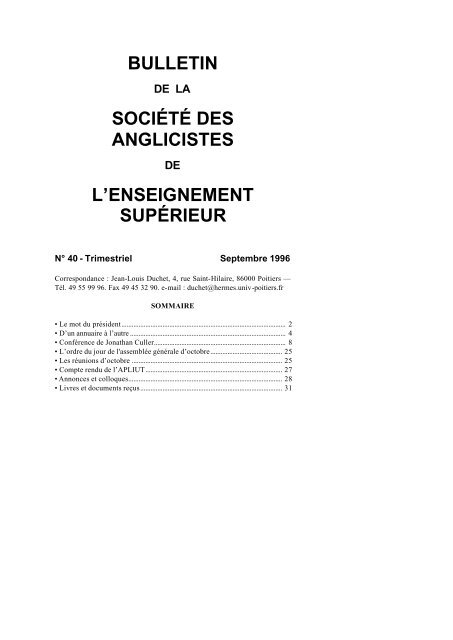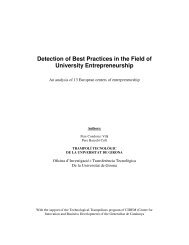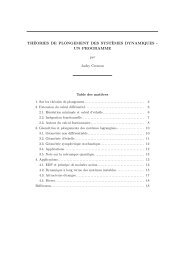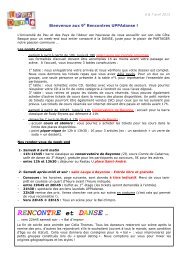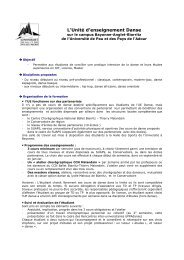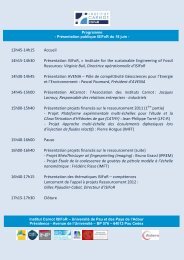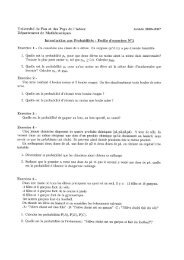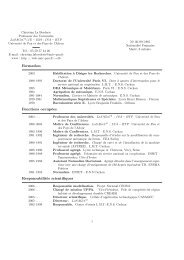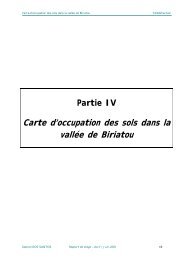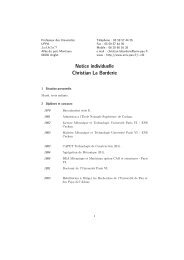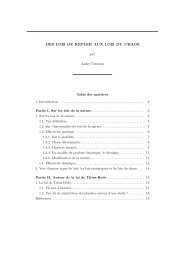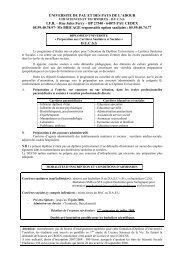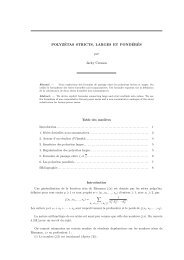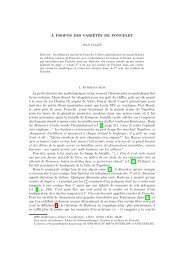bulletin société des anglicistes l'enseignement supérieur
bulletin société des anglicistes l'enseignement supérieur
bulletin société des anglicistes l'enseignement supérieur
You also want an ePaper? Increase the reach of your titles
YUMPU automatically turns print PDFs into web optimized ePapers that Google loves.
BULLETIN<br />
DE LA<br />
SOCIÉTÉ DES<br />
ANGLICISTES<br />
DE<br />
L’ENSEIGNEMENT<br />
SUPÉRIEUR<br />
N° 40 - Trimestriel Septembre 1996<br />
Correspondance : Jean-Louis Duchet, 4, rue Saint-Hilaire, 86000 Poitiers —<br />
Tél. 49 55 99 96. Fax 49 45 32 90. e-mail : duchet@hermes.univ-poitiers.fr<br />
SOMMAIRE<br />
• Le mot du président................................................................................................ 2<br />
• D’un annuaire à l’autre ........................................................................................... 4<br />
• Conférence de Jonathan Culler............................................................................. 8<br />
• L’ordre du jour de l'assemblée générale d’octobre.......................................... 25<br />
• Les réunions d’octobre ........................................................................................ 25<br />
• Compte rendu de l’APLIUT................................................................................ 27<br />
• Annonces et colloques.......................................................................................... 28<br />
• Livres et documents reçus................................................................................... 31
2<br />
Le mot du président<br />
Le premier mot du président nouvellement élu que je suis n’est pas<br />
difficile à trouver : ce ne peut être que le mot “merci”. Et ce “merci” je<br />
l’adresse d’abord, bien sûr, aux membres du comité de la SAES qui m’ont<br />
élu et aux membres du bureau, anciens et nouveaux, dont certains ont<br />
accepté <strong>des</strong> tâches effectivement très lour<strong>des</strong> (je songe en particulier aux<br />
postes de secrétaire général et de trésorier). Je veux l’adresser ensuite, et<br />
avec une certaine solennité qu’une vieille amitié n’interdit pas, à Louis Roux<br />
qui, dix années durant, successivement secrétaire général (1986-1990), viceprésident<br />
(1990-1992) et président (1992-1996), a consacré beaucoup de son<br />
temps, de son énergie et de sa compétence à animer et à développer notre<br />
<strong>société</strong>. Les applaudissements très chaleureux qui ont salué, à Nancy, son<br />
élection à la présidence d’honneur de la SAES étaient sans conteste mérités.<br />
Enfin, je souhaite encore dire merci à nos collègues et amis nancéiens,<br />
organisateurs d’un congrès très réussi et, me tournant vers l’avenir, à nos<br />
amis et collègues niçois, organisateurs de ce qui sera en 1997 le XXXVII e<br />
congrès de la SAES.<br />
Dans l’histoire de notre <strong>société</strong>, le premier “mot du président” a été signé<br />
par Jean Raimond. Il figure dans le numéro 1 du Bulletin, daté de mars 1987,<br />
et on y lit un rappel de l’origine de la SAES, officiellement fondée le 4<br />
octobre 1960. Son premier président était Jean Loiseau et le bureau réunissait<br />
certains grands anciens aujourd’hui disparus, Louis Bonnerot, Maurice<br />
Lebreton et Pierre Legouis , et d’autres, plus jeunes et toujours actifs, Sylvère<br />
Monod, Jean Béranger et Louis Lecocq. “Au fil <strong>des</strong> ans, écrivait Jean<br />
Raimond, les bureaux se sont renouvelés, sous les présidences successives de<br />
Robert Ellrodt, de Jean Dulck et de Pierre Vitoux qui, tous, ont su maintenir<br />
le cap.” Je suis certain que Jean Raimond, à qui je dois d’être entré au bureau<br />
de la SAES, sera d’accord pour que je mette sa liste à jour et pour que l’on<br />
compte désormais, au nombre <strong>des</strong> présidents qui ont su maintenir le cap, les<br />
noms de Jean Raimond, de Jacqueline Genet et de Louis Roux.<br />
Les dix dernières années auront été marquées par la mise en place et<br />
l’amélioration constante <strong>des</strong> moyens d’information et de communication que<br />
la SAES met à la dispositon de ses adhérents, à savoir le Bulletin trimestriel,<br />
l’annuaire et, réalisé en collaboration avec l’Université Paul Valéry-<br />
Montpellier 3, Répertoire. Elles ont également été marquées, avec la création
d’ESSE, par le développement <strong>des</strong> relations internationales de la SAES au<br />
sein de la communauté <strong>des</strong> <strong>anglicistes</strong> européens. Je pense que les années à<br />
venir seront surtout marquées par le rôle croissant que vont jouer, dans le<br />
domaine de la communication, de l’information et de la recherche, les<br />
technologies nouvelles. Nous sommes déjà nombreux à utiliser<br />
quotidiennement la messagerie électronique, et le nouveau bureau a recours<br />
de plus en plus, dans son travail, aux possibilités offertes par l’échange<br />
rapide de messages électroniques et la transmission de documents déjà<br />
formatés. Le développement de ces nouveaux moyens de communication<br />
coïncide avec la disparition de la franchise postale entre universitaires, dont<br />
la SAES bénéficiait indirectement, et devrait permettre, à l’avenir, de faire de<br />
substantielles économies. Dans le numéro de décembre du Bulletin, Jean-<br />
Louis Duchet s’est engagé à expliquer, avec beaucoup plus de compétence<br />
que je n'en ai, l’utilisation que les <strong>anglicistes</strong> français vont pouvoir faire <strong>des</strong><br />
instruments électroniques de communication et d’information. Il suffit que<br />
vous sachiez, pour le moment, que la SAES a déjà une liste de messagerie,<br />
ouverte le 12 juillet à titre expérimental et gratuit grâce au centre de<br />
ressources informatiques de l'Université de Poitiers, qu’elle aura bientôt une<br />
page d’accueil sur le Web, et qu’il vous en sera dit davantage au cours de<br />
notre prochaine assemblée générale, le samedi 5 octobre.<br />
3<br />
Adolphe Haberer
4<br />
D'un annuaire à l'autre<br />
La comparaison <strong>des</strong> annuaires de 1995 et de 1996 fait apparaître les<br />
informations suivantes quant aux mouvements qui ont affecté les membres<br />
de la Société. Une partie de ces informations est sans doute déjà caduque.<br />
Ceci milite pour une parution plus tardive de l'annuaire qui prenne en compte<br />
les changements prenant effet à la rentrée universitaire. L'assemblée de la<br />
SAES sera peut-être amenée à en débattre.<br />
Jean-Louis Duchet<br />
Changements d'affectation<br />
Nom Ancienne Nouvelle<br />
affectation affectation<br />
BALLARD Michel Lille 3 Artois<br />
BERNARD Catherine Orléans Paris 7<br />
BONAFOUS-MURAT Carle<br />
Le Mans<br />
DI MASCIO Patrick Rouen Nice<br />
FINDLAY Rosemary Pau Paris 7<br />
GARNER Steve Le Mans Paris 4<br />
GAUDY Isabelle Paris 3 Keele<br />
GENTY Stéphanie<br />
Evry<br />
GHABRIS Maryam Evry Littoral<br />
HAY Josiane Aix 2 Grenoble 1<br />
HEROU Josette Paris XIII Caen<br />
HUMBLEY John Nancy 2 Paris XIII<br />
INGOUACKA Guy Valenciennes Littoral<br />
ISELIN Pierre Paris X Paris IV<br />
LACROIX Jean-Michel Paris 3 Besançon (Recteur)<br />
MANRY Marie-Agnès Angers Paris XIII<br />
MELIS Gérard Versailles Paris VIII<br />
MONTAGUTELLI Marie Toulon Paris 3<br />
MORVAN Alain Clermont Amiens (Recteur)<br />
OUESLATI Salah Caen Poitiers<br />
PAYCHA Danièle Paris XIII Cergy<br />
PICHLAK Martine Troyes Marne-la-Vallée<br />
REVAUGER Marie-Cécile Grenoble 3 Aix-Marseille I<br />
REYNIER Christine Bordeaux 3 Pau (PR)<br />
SANCERY Arlette Paris XIII Paris IV<br />
SIMARD J.-Pierre St-Etienne Grenoble 3<br />
STEVANOVITCH Colette Rouen Amiens (PR)<br />
STURGESS Charlotte Angers Tours
THERY Michèle Montpellier 3 Paris IV<br />
5<br />
Nouveaux membres de la SAES<br />
Nom Prénom Fonction Affectation<br />
ABDERRAHIQ-LAIB Sakina ATER Besançon<br />
AJI Hélène ATER Amiens<br />
ANTONIN Pascale PRAG Bordeaux I<br />
ATHENOT Eric PRCE Grenoble 3<br />
BALLIER Nicolas ATER Limoges<br />
BASSAC Christian PRAG Bordeaux 3<br />
BORM Jan ATER Amiens<br />
BOUCHER-RIVALAIN Odile MCF Cergy-Pontoise<br />
BOURGEOIS Hélène ATER Amiens<br />
BRAVARD Sophie AMN Lyon 2<br />
BROUETTE Sylvie PRAG Littoral<br />
CAILLATTE Claude ATER Paris 6<br />
CAMPON Maria PRAG Paris 3<br />
CANTONI-FORT Camille AMN Orléans<br />
CELERIER Joëlle CE Toulouse 2<br />
CHAMLOU Laurence PRAG<br />
CHANDA Tirthankar CE Paris 8<br />
CHARRAS Françoise PRAG Montpellier 3<br />
CHAUSSINAND Christelle Ass Agr Lyon 2<br />
COCQUIX-PEZERON Diane ATER Nantes<br />
COINTRE Annie MCF Metz<br />
COL Norbert MCF Lorient<br />
COSTE Jacques-Henri PRCE Lyon 1<br />
COULIBALY Roger Ass Ouagadougou<br />
CRESCI Monique MCF Montbéliard<br />
CRIGNON Hélène ATER Brest<br />
DALZON Christian PRCE Versailles<br />
DELMAS Catherine PRAG Chambéry<br />
DELOGU Christopher MCF Toulouse 2<br />
DIANA Alain MCF Grenoble 1<br />
DJEBALI Taoufik MCF Caen<br />
DORE Geetha CE Paris X<br />
DOUMIT-EL-KHOURY Marielle AMN Paris 3<br />
DROMART Anne PRAG Lyon<br />
DUBOIS René PRAG La Réunion<br />
DUMONT Sylvie PRCE Rouen
6<br />
FIORETTI Evelyne PRAG Grenoble 3<br />
FRAY-MEIGS Divina PRAG Paris 3<br />
GETTLIFFE Patrick MCF Le Mans<br />
GILDEFER Deirdre ATER Paris 6<br />
GOARZIN Anne ATER Rennes 2<br />
GONZALEZ Madalena ATER Aix-Marseille 1<br />
GREENSTEIN Rosalind MCF Paris I<br />
HERVOUET-FARRAR Isabelle MCF Clermont-Ferrand 2<br />
HOFFMANN Catherine<br />
Tours<br />
HURWORTH Angela ATER Paris 7<br />
JOBERT Manuel ATER Lyon 3<br />
JOUET-PASTRE Gabrielle MCF Paris 3<br />
KAENEL André PR Nancy 2<br />
KATZ Daniel MCF Amiens<br />
KILGORE Jennifer ATER Littoral<br />
LA CASSAGNERE Mathilde ATER Montpellier 3<br />
LACABANNE Sonia MCF Grenoble 2<br />
LAUZANNE Alain MCF Rouen<br />
LEBAILLY Hugues PRAG Reims<br />
MACLAREN Alister PRAG Besançon<br />
MAGUIN François PRAG Toulouse<br />
MASSU Claude-Charles PR Aix-Marseille I<br />
MESPLEDE Sophie PRAG Rennes 2<br />
MIKOWSKI Sylvie ATER Paris 6<br />
MOISAN Jean-François MCF Paris XIII<br />
MORCELLET Françoise CE Paris 3<br />
MORSE Ruth PR Paris 7<br />
MORTIER Janie MA Paris XIII<br />
NI RIORDAIN Cliona ATER Paris IX<br />
O'KELLY Dairine MCF Toulouse 2<br />
OMHOVERE Claire Ass.Agr. Nancy 2<br />
PEDOT Richard PRAG Metz<br />
PEGON Claire MCF Aix<br />
PERNOT-DESCHAMPS Marguerite MCF Dijon<br />
PERRIN Isabelle MCF Paris 3<br />
PIQUET François PR Lyon 3<br />
PLUVINAGE Delphine ATER Angers<br />
QUOST Christine CE agr Grenoble 3<br />
RAYNAUD Michel<br />
Toulouse (CPGE)<br />
REMY Michel PR Nice<br />
RICCIOLI Michael MCF Amiens
RITCH Janet Lect Paris IV<br />
RODIER Carole ATER Montpellier 3<br />
ROMANSKI Philippe MCF Rouen<br />
SALATI Marie-Odile MCF Chambéry<br />
SOHIER Jacques MCF Angers<br />
SOULAS Christine PRAG Rennes 2<br />
STENTON Tony MCF Grenoble 3<br />
SUKIC Christine ATER Artois<br />
TERRIEN Nicole MCF Marne-la-Vallée<br />
TERRIER Françoise PRAG Paris<br />
TOUPIN Fabienne MCF Tours<br />
TUDEAU-CLAYTON Margaret<br />
VENUAT Monique ATER Clermont<br />
VIDAUD Richard PRAG La Rochelle<br />
VIENNE-GUÉRIN Nathalie PRAG Rouen<br />
VILLEZ Barbara Lect Paris II<br />
WALTERS James PRAG Besançon<br />
7<br />
Le secrétaire général et le trésorier seront reconnaissants aux intéressés<br />
ou à tout autre membre de la Société <strong>des</strong> corrections et additions qui leur<br />
seront suggérées.
8<br />
English in the Age of Cultural Studies<br />
What will become of English? This is the question I propose to address.<br />
What will become of the study of English in the age of cultural studies?<br />
Since accepting Michel Morel's invitation, this question has taken on a new<br />
poignancy, a new pertinency for me, for I have been drafted to serve as chair<br />
of the department of English at Cornell — my colleagues' revenge for the<br />
sabbatical year I have spent enjoying myself in Montpellier. Now I must<br />
confront the question of what English departments should be doing, or at<br />
least, whether I will be able to bully my colleagues into undertaking serious<br />
discussion of the question of what we should be doing, for it is all too easy<br />
these days, when there are not the resources for new initiatives, to avoid<br />
posing difficult questions about the departmental enterprise as a whole. Do<br />
we have a common enterprise in a Department of English these days or are<br />
we a collection of particular interest groups, linked together only by a<br />
common mail room and a xerox machine?<br />
Some twenty-five years ago, Clark Kerr, president of the University of<br />
California, defined the modern American university as a set of independent<br />
departments and research institutes united by a common parking problem.<br />
This cynical definition, for which Clark Kerr is chiefly remembered today,<br />
nevertheless took for granted that academic departments themselves, at least,<br />
were unified by a discipline or academic mission. Nowadays it is not clear<br />
whether departments are the elementary units of the university. In the United<br />
States they are certainly its données, but do they have enough unity to<br />
function as units — to play the role of the basic functional units of the<br />
university? Is there enough common ground for an English department to<br />
function as a group with a common project?<br />
I know, of course, that the situation of English in France is different from<br />
that of English faculties in England and English departments in the United<br />
States. For one thing, our English departments have a historic mission which<br />
weighs as a heavy burden on the shoulders of the living. In the nineteenth<br />
century, educational thinkers such as Cardinal Newman and Matthew Arnold<br />
gave the study of English literature a crucial cultural role, claiming for it the<br />
special power to serve both as an antidote to materialistic interests stimulated<br />
by capitalism and as a means to promote the unity of a society increasingly<br />
divided by economic and class differences. Newman declared, "by great<br />
authors, the many are drawn up into a unity, national character is fixed, a<br />
people speaks, the past and the future, the East and the West, are brought into
communication with one another." Literature was a special kind of writing<br />
which could help civilize the lower classes (Terry Eagleton speaks of<br />
throwing the workers a few novels to keep them from throwing up a few<br />
barrica<strong>des</strong>), but also the aristocrats, whom Arnold called "the Barbarians,"<br />
and the middle classes (the Philistines), by engaging the mind in complex<br />
ethical issues, inducing readers to examine their own conduct as an outsider<br />
(a reader of novels) would and thus promoting disinterestedness, teaching<br />
sensitivity and fine discriminations, producing identifications with men and<br />
women of other conditions and thus promoting fellow feeling, giving readers<br />
a stake in cultural memory (the tradition of English) and cultivating a<br />
commitment to Englishness. Religion had been discredited and could no<br />
longer function as social cement; philosophy too had been shaken, wrote<br />
Arnold — there is not "an accredited dogma which is not shown to be<br />
questionable" — but poetry could not be discredited by fact or reasoning,<br />
since it is based on imagination, and to it fell the most important social<br />
functions. For great English critics of the twentieth century, such as<br />
I. A. Richards and F. R. Leavis, the terms of celebration changed but the<br />
conviction, nay, the imperative that "English must save us," remained<br />
stronger than ever.<br />
Well, it's hard to imagine saying "English will save us" in a French<br />
university. That should give you a certain freedom; you are not charged with<br />
the historic responsibility of producing the properly educated citizen, of<br />
whom the discriminating professor was the model. Are you the better off for<br />
that? I'm not sure. I suspect that in France that cultural responsibility is<br />
thought to belong to the lycée, and that neither lettres classiques, or lettres<br />
modernes, or philosophie bears, in theory, the burden of maintaining the<br />
culture. Of course départements d'anglais in France do bear the burden of<br />
language teaching, which is more concretely burdensome, if less<br />
intellectually burdensome. But lest you start feeling sorry for yourselves,<br />
remember that, in America, English departments are responsible for teaching<br />
a generation brought up on MTV (Music television) to write English<br />
sentences, and not just English sentences but whole English paragraphs. And<br />
— le comble — when colleagues in other departments are annoyed to<br />
discover that their students don't write very well, they can blame the English<br />
department.<br />
But the question I propose to address concerns the role of the study of<br />
English literature in what I am calling the age of cultural studies. This is a<br />
salient question in both Britain and America, where various books, such as<br />
Anthony Easthope's English into Cultural Studies have declared that cultural<br />
studies is the new dispensation and will take over English departments.<br />
9
10<br />
The situation is somewhat different, of course, for departments of foreign<br />
literature. Foreign language and literature departments in France, as well as<br />
in America, have long been concerned to teach culture or civilization broadly<br />
conceived, not just literature. In the United States, in recent years, foreign<br />
literature departments have explicitly transformed themselves into<br />
departments of French studies or German studies, in the hope of attracting<br />
more students through courses on German fascism, Italian cinema and so on.<br />
(Our German department at Cornell has for some time been affectionately<br />
known as the "anything but German literature department." It offers courses<br />
on Freud, Nietzsche, Lou-Andreas Salome, Nazis, German film, Walter<br />
Benjamin, the Frankfurt school, but seldom a course on Goethe, Rilke or<br />
Mann.)<br />
Of course, even English departments in England and America have long<br />
taught non-literary texts. Perhaps the most famous paper in the Cambridge<br />
English tripos was the paper on British moralists (when I taught at<br />
Cambridge I enjoyed teaching for this paper, which covered, as we said,<br />
"British moralists from Plato to Sartre." Locke and Hume were practically<br />
the only Brits included). But this was high culture. To speak of the age of<br />
cultural studies means something else.<br />
It's hard to say, though, what Cultural studies is. It seems less an<br />
intellectual movement (from which you would expect a certain coherence)<br />
than a "field," as we say. But what is a "field"? It needn't have an<br />
institutional reality — there are few departments of cultural studies or<br />
degrees in cultural studies. What we call "fields" have above all an imaginary<br />
existence, as fantasmatic objects with which people identify. Bookstores,<br />
journals, and publishers play a role here. By publishing and displaying<br />
interesting books under the rubric of cultural studies, they create the <strong>des</strong>ire<br />
and the identifications that produce a field and make it a force to be reckoned<br />
with. These cultural agents helped to make what goes by the nickname of<br />
"theory" a significant field, especially in the United States, even though there<br />
remain to this day very few programs in theory or degrees in theory.<br />
It is understandable that publishers would be attracted to the idea of<br />
cultural studies since this category enables them to avoid deciding whether a<br />
work should be placed under the heading of sociology or film theory or<br />
women's studies, or literary criticism, or all of the above. But <strong>des</strong>pite the<br />
cultural studies shelves in bookstores and the recent proliferation of<br />
introductions and anthologies, it is surpris ingly difficult to work out what<br />
"Cultural Studies" means. The first big anthology, brought out by the main<br />
publisher of cultural studies, Routledge, is called — surprise! — simply<br />
Cultural Studies, edited by Larry Grossberg, Cary Nelson, and Paula
Treichler. This book begins by declaring that cultural studies is neither a<br />
field nor a method, for culture inclu<strong>des</strong> everything and can be studied by a<br />
vast range of methods. "Cultural Studies", the introduction continues, "is thus<br />
committed to the study of the entire range of a society's arts, beliefs,<br />
institutions, and communicative practices." Often the point of cultural studies<br />
seems to be to resist any exclusion that definition might involve. Its defining<br />
principle is to resist exclusion on principle, as a matter of principle. As a<br />
result, it often seems as if the only positive claim is that, whatever is studied<br />
and by whatever method, cultural studies should aim to make a political<br />
difference. The editors write that most of those who identify with cultural<br />
studies, whatever their approach, "see themselves not simply as scholars<br />
providing an account but as politically-engaged participants." "Cultural<br />
studies thus believes", the editors continue, "that its own intellectual work is<br />
supposed to — can — make a difference." This is an odd statement but, I<br />
think, a revealing one: cultural studies does not believe that its intellectual<br />
work will make a difference. That would be overweening, not to say naive. It<br />
believes that its work "is supposed to" make a difference. But is this a credo<br />
to energize a field — "I believe that my work is supposed to make a<br />
difference"? Perhaps sensing a problem, the editors insert a parenthetical<br />
"can", but I suspect that, indeed, the distinguishing feature of cultural studies<br />
may well be the conviction that its work "is supposed" to make a political<br />
difference. It is as though the redemptive goals that have often animated<br />
work in the humanities have been retained by cultural studies, but that it has<br />
abandoned the idea that this goal is linked either to a particular content (such<br />
as, literature will make us whole again) or to a particular method (ideologycritique<br />
will demystify social arrangements and the discourses that sustain<br />
them, and thus ideology, and make change possible). But a redemptive<br />
scenario that lacks either a distinctive content or a particular method for<br />
which claims could be made is scarcely plausible. A strange result indeed!<br />
Since culture is on the one hand the system of categories and assumptions<br />
that makes possible the activities and productions of a society and on the<br />
other hand, the products themselves, the reach of cultural studies is vast. But<br />
since meaning is based on difference, cultural studies in practice has gained<br />
its distinctiveness and its meaning from the interest in popular or mass<br />
culture, as opposed to high cultural forms already being studied in<br />
universities. In the United States, identifying with cultural studies seems to<br />
mean resisting literary studies. To do cultural studies means above all not to<br />
study canonical writers — or to study them only, by way of provocation, as<br />
part of some mass phenomenon.<br />
11
12<br />
Now in Britain, where cultural studies began, the idea of studying popular<br />
culture — the habits and pastimes of the working and lower-middle classes,<br />
for example — had a political charge. Cultural studies was the relay of<br />
proletarian experience. In Britain, where the national cultural identity was<br />
linked to monuments of high culture — Shakespeare and the tradition of<br />
English literature, for example — the very fact of studying popular culture<br />
was an act of resistance, in a way that it isn't in the United States, where<br />
national identity has often been defined against high culture. Jackson Pollock<br />
could be hailed as the great American painter because he departed in so<br />
many ways from the image of high culture. If we take Mark Twain's<br />
Huckleberry Finn as the icon of American literature — the work which does<br />
as much as any other to define Americanness — then we need only recall the<br />
ending, where Huck Finn lights out for the territories because Aunt Sally<br />
wants to "civilize" him. He seeks to escape civilized culture. High culture has<br />
not been part of the definition of national identity in the United States. Au<br />
contraire, traditionally, the American is the man on the run from culture. In<br />
the United States it is scarcely self-evident that shunning high culture to<br />
study popular culture is a politically radical or resistant gesture. On the<br />
contrary, it may involve the rendering academic of mass culture more than<br />
the radicalizing of academic studies.<br />
The origins of Cultural Studies in Britain are associated particularly with<br />
the names of Raymond Williams and Richard Hoggart, the latter the founder<br />
of the Birmingham Center for Cultural Studies. In 1980 Stuart Hall,<br />
successor to Hoggart at Birmingham, published an article, "Cultural Studies:<br />
Two Paradigms," contrasting the early model, associated with Williams and<br />
Hoggart, which undertook to study popular culture as a vital expression of<br />
the working class, with a later model — of Marxist structuralism — which<br />
studies mass culture as meanings imposed on society, an oppressive<br />
ideological formation. The tension between these two options continues to<br />
animate cultural studies today: on the one hand, the point of studying popular<br />
culture is to get in touch which what is important for the lives of ordinary<br />
people — their culture — as opposed to aesthetes and professors; on the<br />
other, there is a strong impetus to show how people are being constructed<br />
and manipulated by cultural forms. There is considerable tension here — so<br />
much so that I find it tempting to define the field of cultural studies by this<br />
tension. Cultural studies, then, dwells in the tension between, on the one<br />
hand, the analyst's <strong>des</strong>ire to analyze culture as a hegemonic imposition that<br />
alienates people from their interests and creates the <strong>des</strong>ires that they come to<br />
have and, on the other hand, the analyst's wish to find in popular culture an<br />
authentic expression of value.
If one takes this tension to define cultural studies, then the central strand<br />
of cultural studies would be that which finds a way of negotiating this<br />
tension, most often these days by showing that people are able to use the<br />
cultural materials foisted upon them by capitalism and its media and<br />
entertainment industries in ways that constitute a kind of culture of their<br />
own. Popular culture is made from mass culture. Popular culture is made<br />
from cultural resources that are opposed to it and thus is a culture of struggle,<br />
a culture whose creativity consists in bricolage, in using the products of mass<br />
culture. If one defines cultural studies as the negotiation of this tension —<br />
the tension between the critique of mass culture as ideology and the<br />
celebration of popular culture as the resistance to the hegemony of capitalism<br />
— then it has a clear logic but becomes much a narrower and graspable<br />
project, so much so that it has the air of a project or particular line of<br />
argument rather than a field.<br />
Indeed, this distinctive project is not what people have in mind when they<br />
speak of "the age of cultural studies," so we come back to our larger<br />
uncertainties, such as whether cultural studies is supposed to study all<br />
culture, of the past as well as present, high as well as low, or whether it<br />
focuses on the present and the popular, in contradistinction to traditional<br />
forms of study. There is also the key question of whether cultural studies is<br />
opposed to contemporary theory or, on the contrary, the concrete expression<br />
of contemporary theory. Some students who embrace cultural studies —<br />
particularly the study of historically marginalized cultures — see themselves<br />
as opposed to theory and as the champions of historical and cultural<br />
particularity. But even if the proponents of cultural studies identify against<br />
"theory," the majority of work that presents itself as cultural studies is highly<br />
self-conscious about, and involved with, theoretical and methodological<br />
questions.<br />
Thinking about the relation between cultural studies and what we call<br />
"theory," I am struck by the similarity between the difficulty of defining<br />
cultural studies and the difficulty of defining "theory." What is theory? Well,<br />
what goes by the nickname "theory" in the United States is sometimes called<br />
"literary theory" because of its links with departments of literature, but it is<br />
certainly not theory of literature in the traditional sense — accounts of the<br />
nature of literature, the distinctiveness of literary language, and so on. Much<br />
of what is central to theory — the historical and genealogical studies of<br />
Michel Foucault, the psychoanalytic theory of Jacques Lacan, the<br />
deconstructive readings of philosophical texts by Jacques Derrida and so on<br />
— is only marginally concerned with literature. Like cultural studies, theory<br />
is broad, amorphous, interdisciplinary. You can imagine almost anything<br />
13
14<br />
fitting in if it is done in a provocative way. What makes something theory, it<br />
seems, is that it is picked up as interesting and suggestive for people working<br />
outside the discipline within which it arises. So discussions of madness or of<br />
perspective, of sexuality or narrative or prostitution, can all enter "theory" if<br />
they seem to have implications, for people's thinking about signification and<br />
the constitution of subjects. If we ask what so-called "theory" is the theory<br />
of, the answer can only be something like signifying practices in general, the<br />
constitution of human subjects, etc. — in short, something like culture, in the<br />
sense that it is given in cultural studies. One might thus conclude, it seems to<br />
me, that cultural studies is — or should be conceived as — the general name<br />
for the activities of which what we call "theory" for short is the theory:<br />
cultural studies is the practice of which what we call "theory" is the theory.<br />
I have offered two hypotheses about cultural studies. The first, the<br />
narrow, is that cultural studies investigates how people make popular culture<br />
from mass culture. This offers little place to literature but it is no threat to the<br />
study of literature. The second is that cultural studies is that practice of<br />
which what we call "theory", for short, is the theory. Here the role of the<br />
study of literature is by no means assured, but since a good deal of so-called<br />
"theory" results from turning skills of literary analysis to the study of other<br />
sorts of texts, literature might still claim a certain centrality.<br />
Why should cultural studies be the new growth area in the humanities? In<br />
a sense, its emergence, at least in the United States, seems a logical result of<br />
the extension of literary methods of analysis to a wide range of non-literary<br />
objects and texts. But in a forthcoming book called The University Beyond<br />
Culture, Bill Readings, a brilliant young English critic who had taught at<br />
Geneva and in the US and Canada, who was killed in a plane crash in 1994,<br />
argues that cultural studies is made possible by a recent shift in the governing<br />
idea of the university. To put it most simply, Kant based the university on a<br />
single regulative principle, the principle of Reason. Humboldt and the<br />
German Idealists gave us the modern university by replacing the University<br />
of Reason with the University of Culture, an institution whose purpose was<br />
jointly teaching and research, given its raison d'être by the production and<br />
inculcation of national self-knowledge, the formation of educated citizens,<br />
imbued with a national culture. Here culture is the goal of the university: for<br />
instance, the reproduction of the man of culture instantiated in the professor<br />
— whence the possibility of such anecdotes as that of a dowager accosting<br />
an Oxford don during the first World War: "Young man, why aren't you in<br />
France fighting to defend civilization." "Madam," came the reply, "I am the<br />
civilization they are fighting to defend."
It was this notion of the university, the University of Culture, that gave<br />
literary studies the centrality that philosophy had enjoyed in the University of<br />
Reason. With the globalization of capital, the importance of forming national<br />
subjects has diminished, the production of the cultured citizen, hitherto the<br />
goal, in theory, of a liberal arts education, has become less central, and the<br />
University of Culture has given way, at least in the US and the UK, to what I<br />
would agree with Bill Readings in calling most simply the University of<br />
Excellence. (In the United States our administrators love to speak of the<br />
university's commitment to excellence, to create "centers of excellence," and<br />
to urge all employees to strive for excellence. The university has no<br />
particular goal, except to have its various parts functioning excellently —<br />
where excellence becomes a contentless measure permitting homogenization<br />
and bureaucratic control. All divisions of the university can be asked to<br />
demonstrate their excellence and since this takes the form or ratings or<br />
rankings they are all rendered comparable, even if they engage in radically<br />
different sorts of activities — advising students, maintaining buildings,<br />
raising funds, teaching history. The University of Excellence need have no<br />
specific goals but is free to strive for excellence without defining it. In<br />
practice, excellence is connected with professionalization: you are judged by<br />
your peers, which means that excellence is determined by how you are rated<br />
by others. In Britain under Thatcher, this became even more explicit than in<br />
the US: ratings of excellence in teaching and research determine the level of<br />
funding for subsequent years.<br />
It is when culture is no longer the goal or purpose of the university that it<br />
can become an object of study among others. As Readings writes, "the<br />
Human sciences can do anything they like with culture, can do cultural<br />
studies, because culture no longer matters for the university."<br />
To flesh out this claim we might say that literature (and to a lesser extent<br />
history and art history) was previously the site where culture could be<br />
observed, assimilated, debated, and studied. The rise of cultural studies is<br />
assisted by arguments that the notion of culture involved in taking literary<br />
study as the instrument of culture is elitist, and by recent analyses of the<br />
nationalist projects of literary studies. These have helped fuel the move to<br />
cultural studies, but cultural studies will not replace literary studies at the<br />
center of the university's idea of itself, first, because cultural studies is not<br />
based on a project of forming cultured citizens. Occasionally in the United<br />
States cultural studies is linked to the idea of forming a non-racist, nonsexist,<br />
non-homophobic, multicultural citizenry, but generally this is not the<br />
impetus, both because the idea of forming a citizenry seems nationalist and<br />
totalizing, and because practitioners of cultural studies think that their<br />
15
16<br />
political intervention will occur in some other way (they believe that their<br />
work is supposed to make a difference but don't say how).<br />
Now that the goal of the production of national subjects is no longer<br />
central, it is perfectly all right for academics in universities to analyze and to<br />
teach all sorts of cultural materials and practices. This is not subversive but<br />
feeds right into the culture industry and constitutes something like its exotic<br />
and pedantic arms. The American press is amused by cultural studies and<br />
likes to run stories about academics writing about Madonna or cereal boxes.<br />
Cultural studies is a continuation of journalism on the one hand and, on the<br />
other, a contribution to the general disdain for academics, who are thought to<br />
make a complicated fuss about things that really should simply be consumed.<br />
But what happens to English in the age of cultural studies? Well, English<br />
departments seem fairly well placed, for different reasons, in both France<br />
and the United States — I'm less sure about the UK. In the US, because they<br />
have been extremely imperialistic, taking on all sorts of studies and<br />
becoming central interdisciplinary departments in the humanities. In France,<br />
on the other hand, the importance of English as a world language will keep<br />
students enrolling in courses in English —lack of students doesn't seem to be<br />
your problem. So the question is, what will happen to the study of English<br />
literature, which has until now been the central activity of English? Though<br />
there are inexorable cultural and economic forces at work—such as the<br />
cultural dominance of television, the rise of vis ual culture, and the<br />
globalization of the economy — I do not think that they ensure the eclipse of<br />
literature. First of all, because, as I have mentioned, culture in the broad<br />
sense adduced by cultural studies cannot replace literary studies as a point of<br />
cultural investment. Quite specifically, there won't be a powerful movement<br />
rallying to the claim that "culture will save us." However popular or<br />
wi<strong>des</strong>pread it becomes, the study of non-literary discourses will not replace<br />
the study of literature by virtue of claims for cultural centrality, will not<br />
become an activity for which central cultural claims are made.<br />
Readings' remark that cultural studies is possible because culture no<br />
longer matters for the university, means that the modern university is<br />
structurally indifferent to what is studied, so that there is not some<br />
compelling rationale for the study of TV sitcoms and advertisements. Thus<br />
the age of cultural studies leaves plenty of space and plenty of scope for<br />
decisions by teachers and by English departments about the contents of their<br />
teaching and the place of literature in that teaching. If cultural studies is the<br />
name for the practice of which what we call "theory" is the theory, then it<br />
allows plenty of room for literary study, but teachers will have to choose to<br />
teach and engage with literature. Its place will not be guaranteed. And the
easons for choosing literature will not be the old ones: that it gives access to<br />
a luminous realm of eternal truths, that it will create national identity and<br />
unite the classes; nor, that it will serve as cultural capital — students fitting<br />
themselves for higher social status by acquiring a capital of knowledge of<br />
literature. It will be rather that literature illustrates in particularly efficient,<br />
dramatic, complex, and engaging ways mechanisms for the production of<br />
meaning; that literary works provide the best, most complex and engaging<br />
occasions for interpretation, and perhaps also that literary works illustrate the<br />
oppositional force of imagination. It is, above all, writing that calls for a<br />
reading and engages readers in problems of meaning.<br />
Finally, I think, the reason for teaching literature is its performative<br />
complexity, whereby works end up engaging readers in processes that do or<br />
illustrate something other than what the works are commonly supposed to<br />
say. Since I do want to talk about an actual literary work this evening, let me<br />
illustrate this with one of the most commonly studied works in English, The<br />
Adventures of Huckleberry Finn. I want to talk about what has long been<br />
held to be the major flaw or failing of the book, the ending.<br />
Ernest Hemingway, who said he would give a million dollars to read<br />
Huckleberry Finn for the first time, also remarked that "you must stop where<br />
Nigger Jim is stolen from the boys. That is the real end. The rest is just<br />
cheating." And most readers find unsatisfying the final chapters of the book,<br />
where Huck reverts to being Tom Sawyer's naive subordinate. Jim, the<br />
runaway slave who has been Huck's companion on the raft, is captured and is<br />
being held at the Phelps' farm. Huck, going to investigate, is mistaken for<br />
Tom Sawyer, but plays along in that role. When the real Tom Saywer arrives<br />
to visit his relatives, he pretends to be Tom's brother Sid, and he agrees to<br />
help Huck free Jim, but insists on an elaborate, interminable rescue<br />
conducted according to what he takes to be the canons of romance<br />
adventures — by smuggling in spoons for Jim to dig a tunnel with, for<br />
instance, rather than opening the door for him.<br />
As readers we have been seduced by the idyll of floating down the<br />
Mississippi and persuaded that questions of freedom and identity are at stake.<br />
If Huck simply fits back into his niche as Tom's sidekick in the juvenile<br />
world of the naughty boy's adventures, this suggests that our assumption that<br />
we have moved into a different sort of moral and idyllic world might be a<br />
delusion. Readers, therefore, have a stake in finding the ending a mistake.<br />
The fact that all the elaborate business at the end is mounted to steal into<br />
freedom a slave who has in fact (though we don't yet know it) already been<br />
set free by the will of his owner, Miss Watson, only increases the sense of<br />
17
18<br />
pointlessness. We want Huck and Jim to float on, on the raft, in nature, into a<br />
fuller state of freedom.<br />
Now American culture has a great investment in the notion of freedom<br />
from civilization — the idea of getting away from it all in an asexual<br />
paradise of comra<strong>des</strong>hip, hunting or fishing or just sitting on a boat, or<br />
floating on a raft incarnates (for Americans) an ideal association of<br />
innocence, nature, and freedom. This image is powerfully with us still, as<br />
witness the American beer commercials in which men sit around in the<br />
woods drinking beer, saying to each other, "Guys, it doesn't get any better<br />
than this." Twain feels the pull of this image, none knows it better, but when<br />
he puts Jim on the raft with Huck, this both makes floating down the river a<br />
more profound quest for freedom—more than adolescent hookey-playing—<br />
and gives freedom a different status, as no longer something that can be<br />
gained simply by lolling on a raft, especially as the raft carries a runaway<br />
slave deeper into slave territory. Twain's problem with the ending is that<br />
since the Mississippi flows from north to south, floating down the river on a<br />
raft carries Jim deeper into slave territory and does nothing to advance his<br />
freedom.<br />
Jim will only be free when he is in society — a society where he won't be<br />
arrested as a runaway slave. This is something that the ending shows in ways<br />
readers find annoying. Tom knows Miss Watson's will has freed Jim but<br />
conceals this knowledge in order to have the adventure of freeing him (in<br />
juvenile adventures which are said to make a mockery of the quest for<br />
freedom). The novel's very emphasis on this elaborate, unnecessary freeing<br />
of Jim puts into relief the fact that the crucial action, the act which makes<br />
Jim free, is Miss Watson's will. Not any of Huck's moral decisions or acts of<br />
generosity or daring, nothing but this legal act—an act which, in the context<br />
of the novel, has three distinctive characteristics. It is an act possible only in<br />
civilization, it is the act of a woman, and it is not a narrative event but an act<br />
locatable only in the curious performativity of a legal document.<br />
What is the significance, in the novel, of the fact that the crucial act is<br />
Miss Watson's will? First, the novel has encouraged us to oppose nature to<br />
culture, to see Huck and Jim as fleeing a constricting and oppressive<br />
civilization, associated with slavery, tight clothes, washing, prayers, Sunday<br />
school, and rigid rules of behavior — fleeing it for nature, in which freedom<br />
is to be found. The fact that the idyll on the raft in the midst of nature<br />
coinci<strong>des</strong> with Huck's moral struggles and his decisions to help Jim gain<br />
freedom encourages us to establish a link between civilization and<br />
constriction, on the one hand, and nature and freedom on the other, and in<br />
this economy of the novel, women are on the side of civilization and
constriction, always wet blankets limiting boy's activities, punishing them for<br />
harmless acts, and generally, as Huck says, out to civilize them. The<br />
unsatisfactory ending, however, in revealing that the freedom for Jim comes<br />
not from nature but from civilization, from the highly rule -bound civil<br />
procedures of the law, and that the act which produces freedom is the act of a<br />
woman, undoes this hierarchical opposition and these alignments.<br />
Specifically, it undermines the possibility of maintaining an opposition<br />
between civilization and freedom, with women on the side of civilization<br />
against freedom.<br />
We readers feel that the ending is unsatisfying because it brings us down<br />
from the idyll in nature, and from the ethical drama's of Huck's struggles<br />
with his conscience, to the literary games played by Tom Sawyer in staging<br />
an unnecessary rescue that deploys all the motifs from the adventure stories<br />
he knows; but the reason this seems so truly unsatisfactory to us may be<br />
precisely that it exposes the idyll of floating down the river, the adventures<br />
of protecting Jim, and Huck's moral struggles, as events which also play no<br />
part in securing Jim's freedom. This freedom derives solely from the legal<br />
event of the will. We readers tend to distinguish the good narrative of nature<br />
and moral drama from the pointless narrative of Phelps' farm, but our<br />
dismayed rejection of the latter may be a defense against the suspicion that,<br />
in relation to the problem of Jim's freedom, the first narrative is equally<br />
irrelevant, a seductive literary construction with motifs more elegant and<br />
durable than those that seduce Tom Sawyer but motifs that are not<br />
fundamentally different in their status from his romantic fancies. Just as Tom<br />
Sawyer wishes to preserve his adolescent romance drama of freeing Jim,<br />
readers of Huckleberry Finn wish to preserve the more sophisticated pastoral<br />
literary drama of seeking Jim's freedom in river adventures and moral<br />
struggles.<br />
The greatness of the book, I suggest, lies in the success with which it<br />
induces us to participate in this process while offering resources to critique<br />
the mythic constructions that seduce us or that we deploy. It elaborates this<br />
myth of nature and freedom with such power that we may tend to forget or to<br />
dismiss as imperfections the ways in which it suggests that these are<br />
secondary to the non-narrative operations that secure freedom in civil<br />
society. In such ways, literature works through a performative complexity, a<br />
resistant relation to what it is generally thought to say — as Twain is<br />
generally thought to have given us a celebration of freedom in nature, the<br />
beginnings of a truly American literature. How ironic that the freedom of the<br />
slave, which it uses to deepen its moral engagement, turns out to depend on<br />
that most civilized European device, the will!<br />
19
20<br />
My point, you may recall, is that among the good reasons for encouraging<br />
the study of literature is the tendency of the best literary works to show us<br />
things other than what they are canonically thought to say. I was<br />
emphasizing that the study of literature needs to be encouraged, for while the<br />
age of cultural studies does not militate against literary study, it certainly<br />
does not guarantee that literary study will take place, and teachers in English<br />
departments will have to make decisions, collectively and individually, to<br />
teach works of literature, if they wish to give literary study pride of place in<br />
their programs.<br />
Such decisions should not be excessively difficult in France where the<br />
American notion of students as customers who should be given what they<br />
believe that they want does not yet hold sway. Consider, for instance, the fate<br />
of the study of poetry. The greatest danger to literary studies in the United<br />
States is the decline of the teaching of poetry, both in secondary schools and<br />
in universities. In schools this is linked to the belief that students want to<br />
study things that seem to them immediately connected to their own lives and<br />
that this means modern narratives, or at least texts without special literary<br />
devices such as meter or strange language. And in American universities,<br />
where students are generally able to choose their courses from a broad set of<br />
offerings, they tend to avoid poetry, as something unfamiliar and unfriendly,<br />
which leads literature departments, in their quest to gain more students, to<br />
make poetry less central to their programs. If the study of poetry is no longer<br />
at the heart of literary study, that has dire consequences, for close attention to<br />
language and to artifice are no longer so central, and thematic and<br />
ideological concerns encounter no resistance as they take over. And once<br />
themes are all that count, why not study movies and tv programs rather than<br />
literature, which requires reading?<br />
Now in France, where you are not so subject to the tyranny of students'<br />
uninformed sense of what they might or might not enjoy, where you have a<br />
tradition of programs established by departments or by state institutions, and<br />
where students do not expect to be able to choose what they like, you are in a<br />
good position to foster the study of poetry. I have been somewhat dismayed<br />
to note, during the past academic year that I have spent in France, here and<br />
there signs of a decline in the place occupied by poetry in the teaching of<br />
English departments, but I hope this is just an accident and not a salient<br />
trend. Let me put it to you bluntly: you are in a good position to see to it that<br />
students work on poetry at all stages of their studies, and it would be a great<br />
shame to waste this opportunity.<br />
For students working in a foreign language poems are crucial: Why do I<br />
say this? Well, educational and philosophical tradition, since Plato at least,
distinguishes good memory from so-called bad memory, Erinnerung from<br />
Gedächtnis, the memory of understanding and assimilation from the memory<br />
of merely mechanical or rote repetition. On the one hand there is what you<br />
have made your own and can reformulate; on the other what you repeat,<br />
parrot-like, as something foreign that has become lodged in your mind, a<br />
piece of otherness. Now novels belong on the side of Erinnerung — as<br />
writing you assimilate. If you remember a novel you recall, in your own<br />
words, as we say, what happens (it is mostly teachers who, perversely, can<br />
quote actual sentences from novels); but poems go with Gedächtnis: to<br />
remember them at all is to remember some of their words, isolated phrases,<br />
perhaps, which stick in your memory, you don't know why. The power to<br />
lodge bits of their language in your mind, to invade and occupy it, is a salient<br />
feature of poems, a major aspect of their being. Poems seek to inscribe<br />
themselves in mechanical memo ry, ask to be learned by heart, taken in,<br />
introjected or housed as bits of alterity which can be repeated, considered,<br />
treasured or ironically cited.<br />
Now students of foreign languages need to have bits of language stick in<br />
their heads: to learn a foreign language involves the mechanical storage of<br />
formulations that incarnate foreignness, and it is better, I would argue, for<br />
this to be memorable formulations of poems than scraps of dialogue about<br />
how to get to Buckingham Palace or Piccadilly Circus. Willy-nilly, English<br />
popsongs will lodge in your students' minds; there ought to be some poems<br />
there as competition for song lyrics.<br />
Second, in purely practical terms, poems are good to teach because they<br />
are short, can be xeroxed, held in front of you, referred to in discussion —<br />
the evidence is right there for all the class to see — they can easily be<br />
recalled and quoted in examinations.<br />
Third, there is a succinct body of technical knowledge about poetic<br />
forms, metrics, which students can learn and which will prove to them that<br />
they have in fact acquired a particular body of knowledge rather than simply<br />
experiencing a random corpus of narratives — which is what literary<br />
education can all too easily become.<br />
Fourth, and more significantly, poems exemplify in brief compass the<br />
mechanisms of language in all their intricacy, the broa<strong>des</strong>t range of devices<br />
for the production of meaning. They are, in short, good to think with.<br />
Finally, poems initiate students into a different relation to language,<br />
where it is not something supposedly transparent but manifestly opaque and<br />
haunting. Lyrics are not heard but overheard. Their puzzling mode of address<br />
to the reader encapsulates, for me, the literary relationship. They introduce<br />
21
22<br />
the possibility of possession by language, fascination with it, as something to<br />
explore, to live with and live in.<br />
For instance, I would like students to experience the eerie fascination of<br />
the resonant but perplexing juxtapositions of poems like W.H. Auden's "The<br />
Fall of Rome." I quote the whole poem to reach the amazing final stanza.<br />
The Fall of Rome<br />
The piers are pummelled by the waves;<br />
In a lonely field the rain<br />
Lashes an abandoned train;<br />
Outlaws fill the mountain caves.<br />
Fantastic grow the evening gowns;<br />
Agents of the Fisc pursue<br />
Absconding tax-defaulters through<br />
The sewers of provincial towns.<br />
Private rites of magic send<br />
The temple prostitutes to sleep;<br />
All the literati keep<br />
An imaginary friend.<br />
Cerebrotonic Cato may<br />
Extol the Ancient Disciplines,<br />
But the muscle-bound Marines<br />
Mutiny for food and pay.<br />
Caesar's double bed is warm<br />
As an unimportant clerk<br />
Writes I DO NOT LIKE MY WORK<br />
On a pink official form.<br />
Unendowed with wealth or pity,<br />
Little birds with scarlet legs,<br />
Sitting on their speckled eggs,<br />
Eye each flu-infested city.<br />
Altogether elsewhere, vast<br />
Herds of reindeer move across
Miles and miles of golden moss,<br />
Silently and very fast.<br />
23<br />
"Altogether elsewhere" is marvelous, and I would like students of English<br />
to recall those reindeer, but I confess that this is not a pedagogically useful<br />
example — it's hard to explain the appeal of these lines. There is a hint of the<br />
mathematical sublime, with the unmasterable natural image — vast herds,<br />
miles and miles of golden moss — where you might expect a reference to<br />
barbarian hor<strong>des</strong>, so that the indifference of those reindeer moving silently<br />
and very fast gives them a kind of innocence as an inescapable reality, — the<br />
antithes is of decadence — the larger picture which makes civilization in its<br />
decline seem somewhat mesquin and not just sinister. In cases like this I<br />
recall Wallace Stevens' dictum: “A poem must resist the intelligence,/<br />
Almost successfully.” That resistance helps produce the power and<br />
fascination of poetry.<br />
More practically, I would like to emphasize the pedagogic<br />
efficiency of brief lyrics, which can pose minor puzzles that students can<br />
work out, as they explore the resources of English and the complexities of<br />
familiar themes. For instance, Gerard Manley Hopkins' "Spring and Fall," to<br />
a young child.<br />
Margaret, are you grieving<br />
Over goldengrove unleaving<br />
Leaves, like the things of man, you<br />
With your fresh thoughts, care for, can you?<br />
Ah, as the heart grows older<br />
It will come to such sights colder,<br />
By and by, nor spare a sigh,<br />
Though worlds of wanwood leafmeal lie;<br />
And yet you will weep, and know why.<br />
Now no matter child, the name,<br />
Sorrow’s springs are the same.<br />
Nor mouth had no, nor mind expressed,<br />
What heart heard of, ghost guessed:<br />
It is the blight that man was born for,<br />
It is Margaret you mourn for.<br />
"And yet You will weep": you persist in weeping in the present, or: you<br />
will weep in the future, or both. "And yet you will weep, and know why":<br />
you know why now, obscurely (heart heard of it and ghost or spirit guessed).
24<br />
Or perhaps: you will know why, in the future, in the wisdom of maturity.<br />
Possibly both: you sense obscurely now what you will later explicitly know.<br />
Or possibly: you persist in weeping and want to know why right away —<br />
which prompts the poem to tell you why, to posit a single source for sorrow<br />
so that weeping for falling leaves is weeping for oneself.<br />
But the hour grows late. Let me leave you with an example of a very<br />
short lyric wh ich does not contain linguistic difficulties to daunt students but<br />
which boldly wagers that poetry will work, will perform, that it can speak to<br />
us, that it can force us to grant it power to speak from beyond the grave,<br />
compelling a relationship. This is a fascinating poem to discuss, by John<br />
Keats: "This Living Hand."<br />
This living hand, now warm and capable<br />
Of earnest grasping, would, if it were cold,<br />
And in the icy silence of the tomb,<br />
So haunt thy days and chill thy dreaming nights<br />
That thou wouldst wish thy own heart dry of blood,<br />
So in my veins red life might stream again,<br />
And thou be conscience calmed — See, here it is —<br />
I hold it towards you.<br />
Boldly asserting what is false, that there is here a living hand, the poem<br />
makes the astounding claims that if this hand were in the grave, we would<br />
wish ourselves dead in order to give it life again. When the poem then claims<br />
to hold out its hand to us, what do we do? Can we resist the power of the<br />
impossible gesture of this language? — "See here it is, I hold it towards<br />
you"?<br />
With no more ado, I release you and urge you thereafter to return to your<br />
universities and to teach poetry, for the good of your students and for the<br />
good of English in the age of cultural studies.<br />
Jonathan Culler<br />
Cornell University
25<br />
Assemblée générale d'octobre 1996<br />
Ordre du jour :<br />
• Approbation du procès -verbal de l’assemblée générale de Nancy<br />
• Rapport du trésorier<br />
• Rapport du secrétaire général : “SAES et communication électronique”<br />
• Intervention <strong>des</strong> présidents <strong>des</strong> jurys de concours<br />
• Le statut <strong>des</strong> PRAG<br />
• Les procédures de recrutement<br />
• Le point sur ESSE<br />
• Questions diverses<br />
• Annonces de colloques<br />
Vendredi 4 octobre 1996<br />
Réunions d'octobre 1996<br />
Bureau de la SAES: 10h30- 13h - Salle 12.<br />
Etu<strong>des</strong> anglaises: 17 h - 18 h 30 - Salle 5.<br />
Association <strong>des</strong> mediévistes <strong>anglicistes</strong> de <strong>l'enseignement</strong> <strong>supérieur</strong>:<br />
14h30-16 h - Salle 5.<br />
Societé d'étu<strong>des</strong> anglo-américaines <strong>des</strong> XVIIe et XVIIIe siècles: Réunion<br />
du bureau de 15 h 30 à 17 h - Salle 12.<br />
Société d`étu<strong>des</strong> anglaises contemporaines: 14 h - 16 h - Salle 16.<br />
Société française d'étu<strong>des</strong> victoriennes et édouardiennes: 16h-17h30 Salle<br />
16.<br />
Société d'étu<strong>des</strong> conradiennes: 17h30 - 18h30 - Salle 16.<br />
Société Française d'étu<strong>des</strong> irlandaises: 16 h - 18 h - Salle 33.<br />
Centre de recherche et d'étu<strong>des</strong> de civilisation britannique: Réunion du<br />
bureau: 14 h - 16 h - Petit amphi. Assemblée générale: 16 h - 18 h - Petit<br />
amphi .<br />
Association <strong>des</strong> linguistes <strong>anglicistes</strong> de <strong>l'enseignement</strong> <strong>supérieur</strong>: 15h30-<br />
17h30- Grand Amphi.<br />
Association <strong>des</strong> <strong>anglicistes</strong> pour les étu<strong>des</strong> de langue orale dans<br />
<strong>l'enseignement</strong> secondaire et <strong>supérieur</strong>: 17h30-19 h- Grand Amphi.
26<br />
Samedi 5 octobre 1996<br />
Groupe d'étu<strong>des</strong> et de recherches de l'anglais de spécialité: 10h30-12h<br />
Salle 5.<br />
Société de stylistique: 9 h 30-11h - Salle 15.<br />
Préparateurs à l'agrégation externe et membres du jury:<br />
Littérature: 9h- 10h, Salle 16<br />
Civilisation: 10h- 11h, Salle 16<br />
Linguistique: 9h- 10h, Salle 33.
Compte rendu du XVIII e congrès de<br />
l’APLIUT<br />
27<br />
“Stratégies d’apprentissage” était le thème du XVIII e congrès de<br />
l’APLIUT (Association <strong>des</strong> professeurs de langue vivante en IUT) qui s’est<br />
déroulé à l’IUT de Tarbes les 6, 7 et 8 juin 1996 ; il a réuni 120 participants<br />
venant de tous les coins de France et de Grande-Bretagne.<br />
Les communications ont porté sur les définitions et typologies <strong>des</strong><br />
stratégies d’apprentissage d’une langue étrangère ; les intervenants ont<br />
indiqué les méthodologies de recherche actuellement mises en œuvre (Janet<br />
Atlan, Françoise Raby et Christine Vaillant). Bob Burden et Marion<br />
Williams ont dressé un tableau quasi exhaustif de l’étude de la motivation, et<br />
en ont développé l’approche cognitive. À partir de réflexions théoriques, <strong>des</strong><br />
exemples pratiques ont été fournis pour aider l’apprenant à élaborer ses<br />
propres stratégies d’apprentissage (Dick Allright, Bernadette Grancolas, Joan<br />
Allwright). Quelles sont les fonctions cognitives et métacognitives qui<br />
contribuent à l’élaboration de leurs stratégies d’apprentissage ? Qu’est-ce qui<br />
caractérise un “bon apprenant” en langues ? Comment prendre en compte la<br />
diversité <strong>des</strong> profils pédagogiques et <strong>des</strong> types cognitifs dans l’acte<br />
d’enseignement ? Telles sont quelques unes <strong>des</strong> nombreuses questions qui<br />
ont été abordées au cours de ces trois jours.<br />
Ce congrès s’est déroulé dans d’excellentes conditions grâce à l’aide <strong>des</strong><br />
institutions locales et régionales (IUT de Tarbes, Conseil Général <strong>des</strong><br />
Hautes-Pyrénées et Conseil Régional) et du soutien du British Council. Le<br />
prochain congrès de l’APLIUT aura lieu à l’IUT de Nancy II du 5 au 7 juin<br />
1997, avec la participation de CETaLL (Commission on Educational<br />
Technology and Language Learning) de l’AILA ; le thème sera<br />
“Enseignement <strong>des</strong> langues et nouvelles technologies”.
28<br />
Colloques<br />
Les collégues à contacter dont le nom n'est suivi d'aucune adresse sont<br />
répertoriés dans l'annuaire de la S.A.E.S.<br />
— Du 7 au 11 septembre 1996: Séminaire de linguistique diachronique<br />
organisé par l'ALAES à l'Université de Poitiers. Contacter Marc Fryd,<br />
Séminaire ALAES Poitiers 1996, Faculté <strong>des</strong> Lettres et <strong>des</strong> Langues, 86022<br />
Poitiers Cedex; e-mail Marc.Fryd@univ-poitiers.fr - Tél. 49 43 79 66.<br />
— Les 20 et 21 septembre 1996: European Conference on British Studies:<br />
Comparative and Intercultural Approaches. Université Paris XIII. Contacter<br />
François Poirier. Tél. 1 49 40 37 68 - Fax 1 49 40 39 22; e-mail<br />
Fpoirier@duniv-paris 13.fr<br />
— Les 23, 24 et 25 septembre 1996: Colloque à Amiens de la SERCIA<br />
sur "Dispositifs narratifs policiers dans le cinéma anglophone". Contacter<br />
Domin ique Sipière, Université de Picardie ou Reynold Humphries,<br />
Université de Lille III.<br />
— Les 15 et 16 novembre 1996: Colloque de la SEAC à Paris IV sur<br />
"Lecteurs/Lectures". Contacter François Gallix.<br />
— Les 29 et 30 novembre 1996: Journées Shakespeare sur Ha mlet à<br />
l'Université d'Aix-Marseille I (Aix-en-Provence). Contacter Gilles Mathis.<br />
— Les 13 et 14 décembre 1996: Colloque de l'Equipe Langues de<br />
l'Université d'Angers sur "L'idée coloniale." Contacter Jeanne Devoize ou<br />
Jacques Sohier.<br />
— Les 13 et 14 décembre 1996: Colloque du CERAN à Lyon II sur "La<br />
poésie moderne: écriture de la limite, écriture à la limite." Contacter Jean-<br />
Marie Fournier ou Adolphe Haberer, 86 rue Pasteur, 69365 Lyon Cedex 07;<br />
e-mail : Adolphe.Haberer@univ-lyon2.fr<br />
— Les 14 et 15 décembre 1996: L'université de la Réunion organise un<br />
colloque sur la place de la femme dans la nouvelle <strong>société</strong> multiculturelle<br />
d'Afrique du Sud.
— Les 10 et 11 janvier 1997: 20e Colloque de la SFEVE à Lille III sur<br />
"L'Enfance". Contacter Françoise Dupeyron-Lafay (communications) et<br />
Michel Krzak (organisation pratique).<br />
— Les 31 janvier et 1er février 1997: Premier colloque de la Société<br />
d'Etu<strong>des</strong> Woolfiennes, fondée par Christine Reynier avec la collaboration de<br />
Catherine Bernard, Catherine Lanone et Carole Rodier. "Métamorphose et<br />
récit dans l'œuvre de Virginia Woolf." Propositions de communication à<br />
envoyer à Christine Reynier.<br />
— Les 31 janvier et 1er février 1997: Colloque du Centre de recherche et<br />
d'étu<strong>des</strong> sur la nouvelle en langue anglaise de l'Université d'Angers sur<br />
"Other Places, Other Selves ?". Propositions de communication avant le ler<br />
septembre 1996. Contacter Emmanuel Vernadakis.<br />
— Les 7 et 8 février 1997: Colloque du Centre <strong>des</strong> cultures anglosaxonnes<br />
de l'Université de Toulouse-Le-Mirail sur "The Millenium and<br />
Utopia in Anglo-Saxon Countries." Contacter Jean-Louis Breteau. Tél. 61 50<br />
43 09 ou Christiane Fioupou. Tél. 61 50 49 28 ou 61 50 35 50.<br />
— Les 7 et 8 février 1997: Colloque du Centre de recherche sur<br />
l'imaginaire dans les littératures de langue anglaise, sur "La Métamorphose".<br />
Université de Reims. Contacter Mme Dorangeon.<br />
— Les 7 et 8 mars 1997: Colloque international de l'équipe "Lieux de<br />
mémoire" du CREPLA à l'Université de Savoie (Chambéry) sur "Lieux et<br />
objets de mémoire." Propositions avant le 15 septembre 1996. Contacter:<br />
Jean Kempf, Dépt. d'anglais, Université de Savoie, BP 1104, F-73011<br />
Chambéry. Tél. 79 96 93 38 - Fax 79 75 85 99. e-mail<br />
Jean.Kempf@univsavoie.fr<br />
— Les 21 et 22 mars 1997: Colloque annuel de la SOFEIR (Société<br />
Française d'Etu<strong>des</strong> Irlandaises) à l'Université de Tours sur "Irlande,<br />
vision(s)/révision(s)". Responsable: Martine Pelletier, UFR Anglais -LEA,<br />
Université François Rabelais, rue <strong>des</strong> Tanneurs, 37041 Tours Cedex.<br />
— Les 21, 22 et 23 mars 1997: Colloque annuel du GRENA (Groupe de<br />
Recherche et d'Etu<strong>des</strong> Nord-Américaines: Serge Ricard) à l'Université de<br />
Provence sur "Voyageurs et voyages" ou "Travels and Travellers."<br />
Responsable: Gérard Hugues, IRMA, Université de Provence, 29 avenue<br />
29
30<br />
Robert-Schuman, 13621 Aix-en-Provence Cedex 1 (proposition avant le ler<br />
octobre 1996).<br />
— Du ler au 4 septembre 1997: Université de Freiburg en Allemagne.<br />
Second IALS (International Association of Literary Semantics), Conférence<br />
1997. Contacter Monika Fludernik, Professor of English Literature,<br />
Englisches Seminar, D-79085 Freiburg i.B.R., Allemagne. Tél. 49 761 203<br />
3310 Fax 49 761 203 3359 ou 3340.<br />
— Les 30 et 31 janvier 1997, Faculté <strong>des</strong> Lettres de l'Institut Catholique<br />
de Paris, "Rencontres poétiques du monde anglophone". Après une<br />
présentation académique, les poètes invités liront une sélection de leur<br />
œuvre: Denis Levertov, Debjani Chatterjee, Kenneth White, Derry<br />
O'Sullivan. Des ateliers de traduction de poèmes seront organisés le 31<br />
janvier 1997. Contacter Isabelle Schwartz-Gastine, Faculté <strong>des</strong> Lettres de<br />
l'Institut Catholique de Paris, 21 rue d'Assas, 75006 Paris.<br />
— Les 14 et 15 mars 1997, à l'Université Blaise-Pascal, Clermont-<br />
Ferrand, "Valeurs de contrôle". Contacter Alain Suberchicot, Programme<br />
champ culturel anglophone, 34 av. Carnot, 63037 Clermont-Ferrand Cedex.<br />
— Les 5, 6 et 7 juin 1997, Université de Versailles Saint-Quentin,<br />
Colloque sur "Romantisme et modernité", en partenariat avec le centre de<br />
recherches poétiques de l'E.N.S. de Fontenay-Saint-Cloud. Renseignements<br />
auprès d'Isabelle Bour, Eric Dayre ou Patrick Née, Département <strong>des</strong><br />
Humanités, 47, Bd Vauban, 78047 Guyancourt Cédex.<br />
Appel à contribution<br />
Alizés, la revue angliciste de La Réunion réunira <strong>des</strong> articles autour du<br />
programme du CAPES. Les propositions de contribution devront parvenir<br />
avant le 15 décembre 1996 à l'adresse suivante:<br />
Alizés, Département d'Étu<strong>des</strong> Anglophones, Faculté <strong>des</strong> Lettres et <strong>des</strong><br />
Sciences Humaines, Université de La Réunion, 15, av. René-Cassin,<br />
B.P. 7151, 97715 SAINT-DENIS Messag Cedex 9.<br />
Les articles ne dépasseront pas 30 000 signes, seront rédigés en français<br />
ou en anglais, devront suivre les normes de présentation du MLA Handbook,<br />
et être accompagnées d'une version sur disquette (IBM ou Apple).
Livres et documents reçus<br />
31<br />
— Palimpsestes, n°10, Presses de la Sorbonne Nouvelle, 1996, sous la<br />
direction de Paul Bensimon et Didier Coupaye, Niveaux de langues et<br />
registres de la traduction (2 vol.)<br />
— Jean-Jacques Lecercle, La violence du langage, traduction de l’anglais par<br />
Michèle Garlati, Paris, PUF, 1996, viii + 285 pp.<br />
— Les Cahiers du Sahib, éd. Michel Renouard, n°4, Rennes, P.U. de Rennes,<br />
1996, 288 pp.<br />
— Le modèle économique anglo-saxon à l'épreuve de la globalisation, éd.<br />
Martine Azuelos, Paris, Presses de la Sorbonne Nouvelle, 1995.<br />
— L’Espace urbain européen ou “Que faire du centre ville ?”, éd. Yvette<br />
Marin, Les Cahiers du CREHU n°6, Besançon, Annales littéraires de l’U.<br />
de Franche-Comté, 1996, 298 pp.<br />
— Les Cahiers de l’APLIUT, vol. XV, n°4, juin 1996.<br />
— TransLittérature, éd. ATLF et ATLAS, n°11, été 1996.<br />
— Catherine Maignant, Histoire et civilisation de l’Irlande, Paris, Nathan,<br />
1996, 128 pp.<br />
— Agnès Maillot, IRA. Les républicains irlandais, Caen, P.U. de Caen,<br />
1996, 277 pp.<br />
— Michael McLaverty, Nouvelles, trad. sous la direction de Jacqueline<br />
Genet et Élizabeth Hellegouarc’h, préface de Seamus Heaney, Caen, P.U.<br />
de Caen, 1996, 334 pp.
32<br />
Alain CAZADE<br />
Trésorier<br />
ADRESSES DES MEMBRES DU BUREAU<br />
2ter rue Jean-Fallay<br />
93250 VILLEMOMBLE<br />
Fax: 42 09 18 56. Tél.: 49 94 38 43<br />
Ludmilla DELORME 2, place du 11 Novembre 1918<br />
Vice-Présidente<br />
33700 MÉRIGNAC-LES-EYQUEM<br />
Fax : 56 31 86 17. Tél.: 56 97 84 72<br />
Jeanne DEVOIZE<br />
Vice-présidente<br />
Jean-Louis DUCHET<br />
Secrétaire Général<br />
Adolphe HABERER<br />
Président<br />
Marie-Jeanne LAGADEC<br />
Secrétaire adjointe<br />
André MURAIRE<br />
Vice-président<br />
Michel PETIT<br />
Secrétaire adjointe<br />
Albert POYET<br />
Vice-président<br />
15, rue de Brissac<br />
49000 ANGERS<br />
Fax: 41 24 92 67. Tél.: 41 87 60 25<br />
4, rue Saint-Hilaire<br />
86000 POITIERS<br />
Fax: 49 45 32 90. Tél.: 49 55 99 96<br />
1, route de Saint-Antoine<br />
69380 CHAZAY D'AZERGUES<br />
Fax: 78 69 72 26. Tél.: 78 43 65 24<br />
130, boulevard Masséna<br />
75013 PARIS<br />
Fax : 45 87 41 75. Tél.: 45 83 06 24<br />
L'Ombrienne, rue <strong>des</strong> Oliviers<br />
06110 LE CANNET<br />
Fax: 93 37 55 36. Tél.: 93 31 44 47<br />
Villa Coccinelle, 32 route Bleue<br />
13620 CARRY-LE-ROUET<br />
Fax: 42 64 19 08. Tél.: 42 45 45 71<br />
48, allée <strong>des</strong> Martyrs de la Libération<br />
31400 TOULOUSE<br />
Fax: 61 50 48 35. Tél.: 61 52 68 62<br />
Michel PRUM<br />
24, rue de la Providence, 95800 CERGY<br />
Trésorier-adjoint Fax: 30 75 05 65. Tél.: 30 30 95 30<br />
Le directeur de la Publication : Adolphe Haberer. ISSN : 0982.3654<br />
Imprimé par Reboul Imprimerie s.a., 2-4 r Etienne-Mimard, 42000 Saint-Etienne<br />
Dépôt légal: 3 e trimestre 1996 : 1300 exemplaires. 32 pages.


